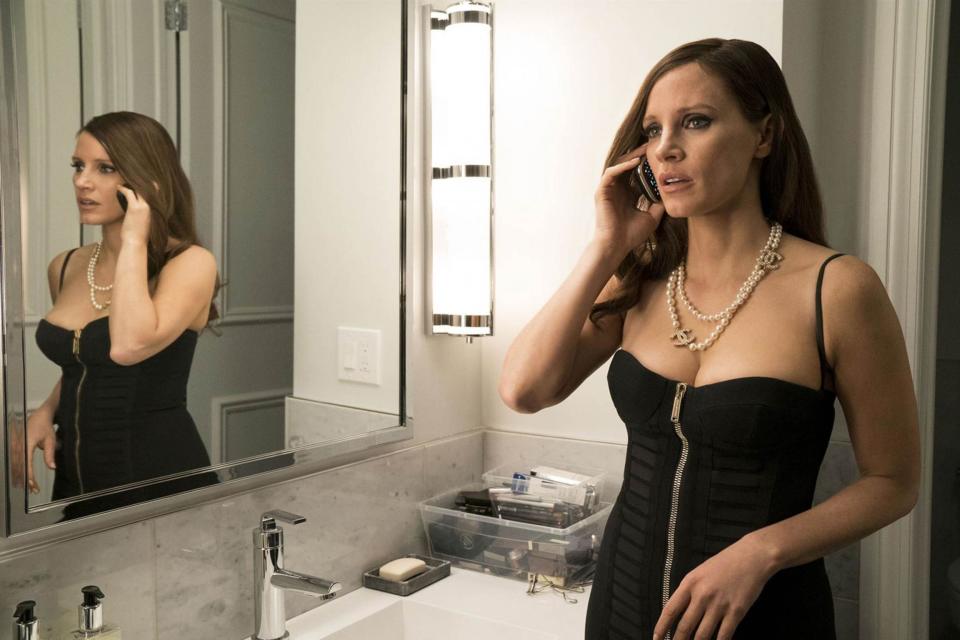No sex, no sidekick: Molly’s Game breaks the mould

Aaron Sorkin, maker of The Social Network and the biopic Steve Jobs, returns to cinemas with Molly’s Game, out in January.
Earlier this week I went to a preview screening. I started cynical but left pleasantly surprised. This film is based on the true story of a woman called Molly Bloom — no allusion intended to Joyce’s Ulysses — to the who’d risen from secretary to running high-stakes poker games in New York before the mob and the FBI arrived.
It was pitched hard as a film about strong women. It this case Molly was played by Jessica Chastain, with high glamour and bunny girls as equals to the cast of filthy-rich and lush men at the poker tables.
But it didn’t follow the script. There was no sex in film, and no best friend to save the day. Apply the Bechdel test to it — does it have at least two women in it who talk to each other about something besides a man? — and the answer is: barely. There’s one brief conversation between Molly, who runs the card-game business and her poker dealer, a woman, about hedging risk that might qualify.
As you watch it you realise that just as much as you’ve been trained in how to read a western, a comedy or a sci-fi film, you’ve also been trained in what to expect from films billed as “for women”, ie, something in the paradigm of Thelma and Louise or Frances Ha, where close friendships make it feminist.
And that is its own trap.
Molly’s Game is a film about a woman going it alone, pretty much the most unusual thing on the silver screen. It doesn’t fit the Bechdel model well. Then again, as part of the drive to get women portrayed as three dimensional in modern Hollywood, this is a great step forward: Molly Bloom doesn’t need a sidekick to get to the top of her poker game.
Let’s dance! All the best parties end with a festive boogie
It was just another Christmas party, around 9pm, when the DJ arrived at his stand. Held at the studio of a music legend now in his 60s, it was surprisingly unshowy. There were trays of dips and cheese straws from the supermarket, a smattering of well-known faces. But this was in fact more of a polite drinks for neighbours, friends, associates: a curious mixture of young women with sharp haircuts, older men in suits and some groovers, with most people not really knowing one another. It was socially jagged, and then the DJ hit play and the music changed it all.
One man, who’d been in a leather jacket, ripped it off and became possessed by Michael Jackson beats; a woman had one foot in a kitten-heel shoe and the other in a hefty plastic foot cast — this proved no impediment to her throwing her shapes. Guys in suits shed their jackets, women took off their shoes, and the man who hosted the party bobbed gently to music, delighted that he’d worked this magic on the room.
We don’t dance enough. We should dance more. Indeed, it should be the aim of every decent party: to make us forget our social anxieties and ambitions and move on to a dancefloor and loosen up.
I probably bonded more with that group of people through shaking our limbs at one another than any high-powered small talk at the other drinks parties I’ve gone to this year.
That room could have gone all night. But at 11.12pm everything suddenly went silent. The amp had overheated. The host apologised. The magic disappeared.
We must keep the internet neutral
Net neutrality, brought in by Barack Obama, was yesterday repealed by President Trump’s Federal Communications Commission (FCC) in the name of market liberalisation.
Its central tenet was that all content is created equal. Every internet service provider had to treat clunky old Vimeo as the equal to slick Netflix. It has been a kind of democracy: all websites travel down the wires at the same speed.
The FCC decision means a content provider that puts big bucks on the table gets delivered superfast. Does this matter? Yes.
A decade ago Amazon reported that 100 milliseconds of latency cost them one per cent of sales, which would now be hundreds of millions a year. Money can throttle newcomers out of the market. Money buys our micro-attention spans. The UK is already net neutral, thanks to EU regulations. Don’t let Liam Fox talk us out of it.
It’s never too early for a latte
AT 4.50 this morning a friend replies to my text from last night to say she’s up early and waiting for her Starbucks to open. I’m wide awake, counting down the minutes on my neighbourhood Pret. I wouldn’t want to ask the hard-working baristas of London to get in earlier just to serve our flat-white addictions but we should let them know how pleased we are to see them in the mornings.

 Yahoo News
Yahoo News 